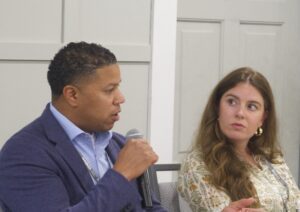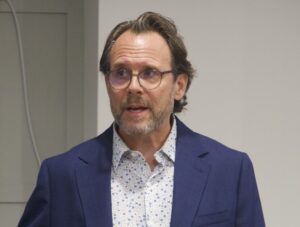Who is a member?
Our members are the local governments of Massachusetts and their elected and appointed leadership.

During the Massachusetts Municipal Human Resources Fall Conference on Sept. 12 in Falmouth, Dewand Neely, MGT Consulting Group’s chief information officer, left, discusses artificial intelligence on a panel with Chelsea Deputy Director of Operations Devon Fields.
Emerging topics in municipal human resources management, including artificial intelligence and inclusivity in the workplace, were the focus of the annual Massachusetts Municipal Human Resources Fall Conference on Sept. 12 and 13 in Falmouth.
The program opened with the workshop “AI and HR: Friends or Foes?” led by two representatives from MGT Consulting Group: Chief Information Officer Dewand Neely and Senior Vice President for Human Capital Joellen Cademartori.
Neely gave an overview of GPTs, or Generative Pre-Trained Transformers, a type of AI tool that is trained on a wide range of existing data — from sources such as books, articles and websites — in order to generate responses to specific prompts.
He briefly demonstrated how GPT tools can be used to help draft policy, streamline communications, and standardize the format of official documents. GPT tools cannot complete those tasks independently, he said, but can help to “augment things you’re already doing as HR professionals.”
Artificial intelligence was also the topic of an afternoon discussion panel featuring Neely, attorney Nan ONeill of Murphy, Hesse, Toomey & Lehane, and Chelsea Deputy Director of Operations Devon Fields.
The panelists discussed the legal landscape of AI use in municipal government, and the opportunities and challenges it poses to HR professionals.

During the Massachusetts Municipal Human Resources Fall Conference on Sept. 13 in Falmouth, David Sewell McCann leads a workshop on storytelling and listening strategies for navigating conflict.
ONeill said “there has to be some element of human consideration,” in order to prevent bias or error when using GPT and other AI tools.
“It needs to be reviewed,” she said. “Whether it’s a dress code or some other policy, for example, a second pair of eyes needs to be on it.”
The panel also shared strategies for improving AI literacy among employees and gauging how it’s already being used in city or town hall.
“The onus is on the communicator to meet people where they are,” Fields said.
In Chelsea, she said she found that introducing employees to the topic of AI with an article or podcast gave them “the time and space to digest” before discussing it in meetings.
“Empathy, community, and context,” Neely added. “A computer can’t do that.”
In the afternoon, Teresa Cruz Foley, Founder and Lead Consultant of Brave Space Consulting, led a diversity, equity, and inclusion workshop on mindfulness strategies for advancing inclusivity in the workplace and improving employee wellness and engagement.
Mindfulness practices that “get us back into our bodies” can help to calm the stress response and increase empathy and social-emotional intelligence in diverse settings, she said.
“We are able to do better when we feel better,” Foley said.
The day one agenda also included a legislative update from MMA Legislative Director Dave Koffman and a pilot networking session for MMHR’s regional subgroups.
David Sewell McCann opened day two with a workshop on storytelling and listening strategies for navigating conflict. In a series of interactive exercises, McCann helped participants seek out connection before moving forward in difficult interactions with employees.
“The point of storytelling is to make a connection first,” he said. “Because on the other side of that is problem-solving.”
He shared “story-listening” techniques to help participants digest and retain information, even in tense situations.
MIIA Wellness Representative Lori Lambert-Osburn concluded the day with a wellness workshop for HR professionals. Participants took a self-assessment to gauge their mental health and self-care habits, and learned strategies for taking manageable steps toward improvement.
Lambert-Osburn advised participants to “dream big, and start small.”